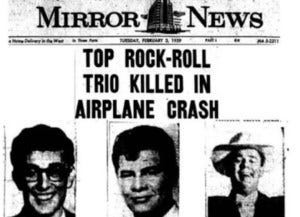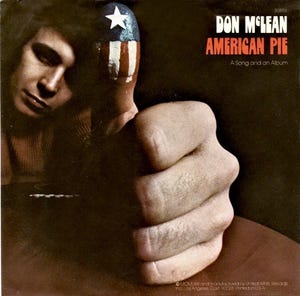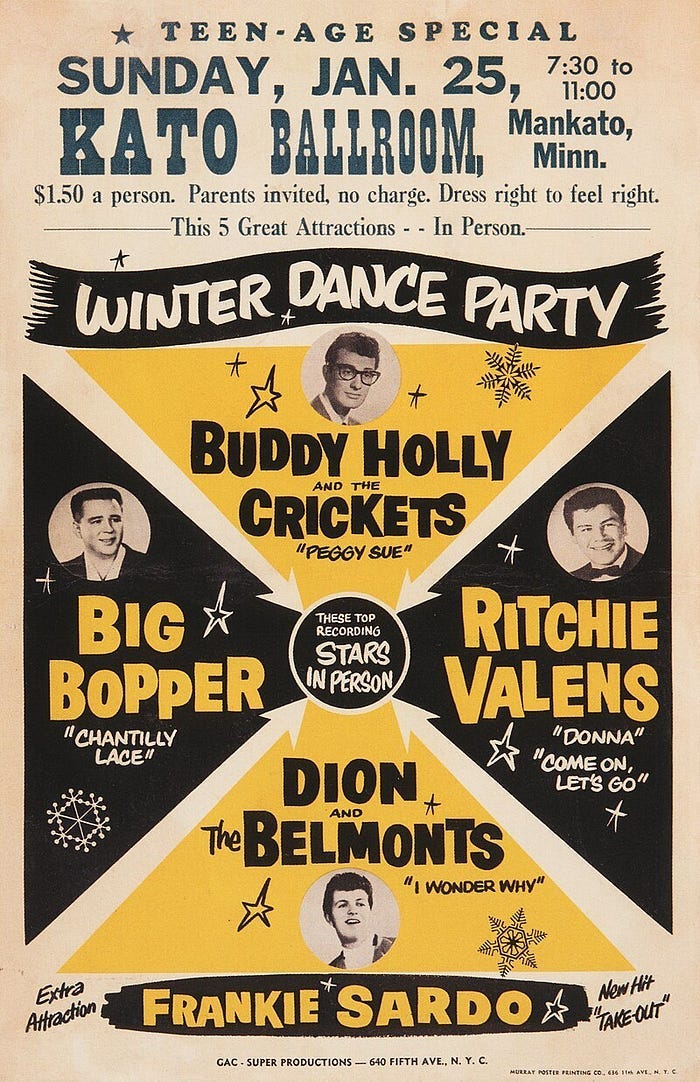On February 3, 1959, a plane crash occurred in Iowa during a snowstorm shortly after 1:00 AM, killing three young rock and roll singers who would go down in history: Buddy Holly, Richie Valens, and J.P. “The Big Bopper” Richardson. They were part of the 24-day “Winter Dance Party” tour.
Their story would later be captured as “long, long time ago” in the 8 1/2 minute hit song “American Pie” by Don McLean, released twelve years later in 1971.
Many attempts have been made to decrypt the lyrics of this abstract song. Though never explicitly stated — except that the song is dedicated to Buddy Holly — these musicians appear to represent:
“the three men I admire most, the Father, Son, and the Holy Ghost… the day the music died.“
When was The Day the Music Died?
“February made me shiver… bad news on the doorstep”
… is the date of the crash. These performers were planning a 24-city “Winter City Party Tour.” The bus was so cold that Buddy Holly decided to charter a plane to the next venue in Fargo, N.D. But the plane didn’t make it.
Who were those who Died The Day the Music Died?
Richard Valenzuela, aka Richie Valens, only 17, currently had a hit with La Bamba.
Buddy Holly had several hits, including That’ll Be The Day and Peggy Sue. His song Peggy Sue Got Married was later turned into a hit movie by Francis Ford Coppola, starring his nephew Nicolas Cage (Coppola).
“The Big Bopper,” mentioned by Nicolas Cage in that same movie, was not the name of a hamburger but the singer of the hit song Chantilly Lace.
Why Did He Write The Day the Music Died?
Looking back from the beginning of the ’70s, McLean writes a farewell to the idyllic music of the ’50s and ’60s with a chorus that uses a popular symbol of Americana, namely Apple Pie.
With his memories as a 13-year-old on the occasion of the plane crash, which he learned while folding newspapers for delivery, he recounted in 2015, when he sold the lyrics for $1.2M, that the music that progressed from that time “when… I can still remember how that music used to make me smile” to the early ’70s was as follows:
“Basically in ‘American Pie’ things are heading in the wrong direction…
It [life] is becoming less idyllic. I don’t know whether you consider that wrong or right but it is a morality song in a sense.”
What Did “American Pie” Mean?
Don McLean avoided explaining the lyrics to this song for many years but said he would do so when he sold the lyrics. He did reveal the meanings of some of the lyrics at that time:
“the king” = Elvis Presley
“the jester” = Bob Dylan
“ten years” = the death of audience member Meredith Hunter at the Altamont Free Concert, ten years after the fateful plane crash. In what has been called “Woodstock of the West,” the Hells Angels provided stage security for the concert. While Mick Jagger [aka Jumpin’ Jack Flash] of The Rolling Stones performed “Sympathy for the Devil,” Hunter, who was high on methamphetamines, got into a fight with the Hells Angels and was stabbed to death. Rolling Stone Magazine called it “rock and roll’s all-time worst day… a day when everything went perfectly wrong.”
Here are the lyrics:
Now for ten years we’ve been on our own,
and moss grows fat on a rollin’ stone…Oh, and as I watched him [Jack] on the stage
My hands were clenched in fists of rage
No angel born in Hell
Could break that Satan’s spellAnd as the flames climbed high into the night
To light the sacrificial rite
I saw Satan laughing with delight
The day the music died
Oh, and the name of the plane? Was it, as has often been said, “American Pie?”
No, that’s an urban legend. The plane’s only designation was what was on the wing registration: N3794N.
Bye, bye, Miss American Pie…
Bill Petro, your friendly neighborhood historian
billpetro.com
Podcast:
Subscribe to have future articles delivered to your email. If you enjoyed this article, please consider leaving a comment.






